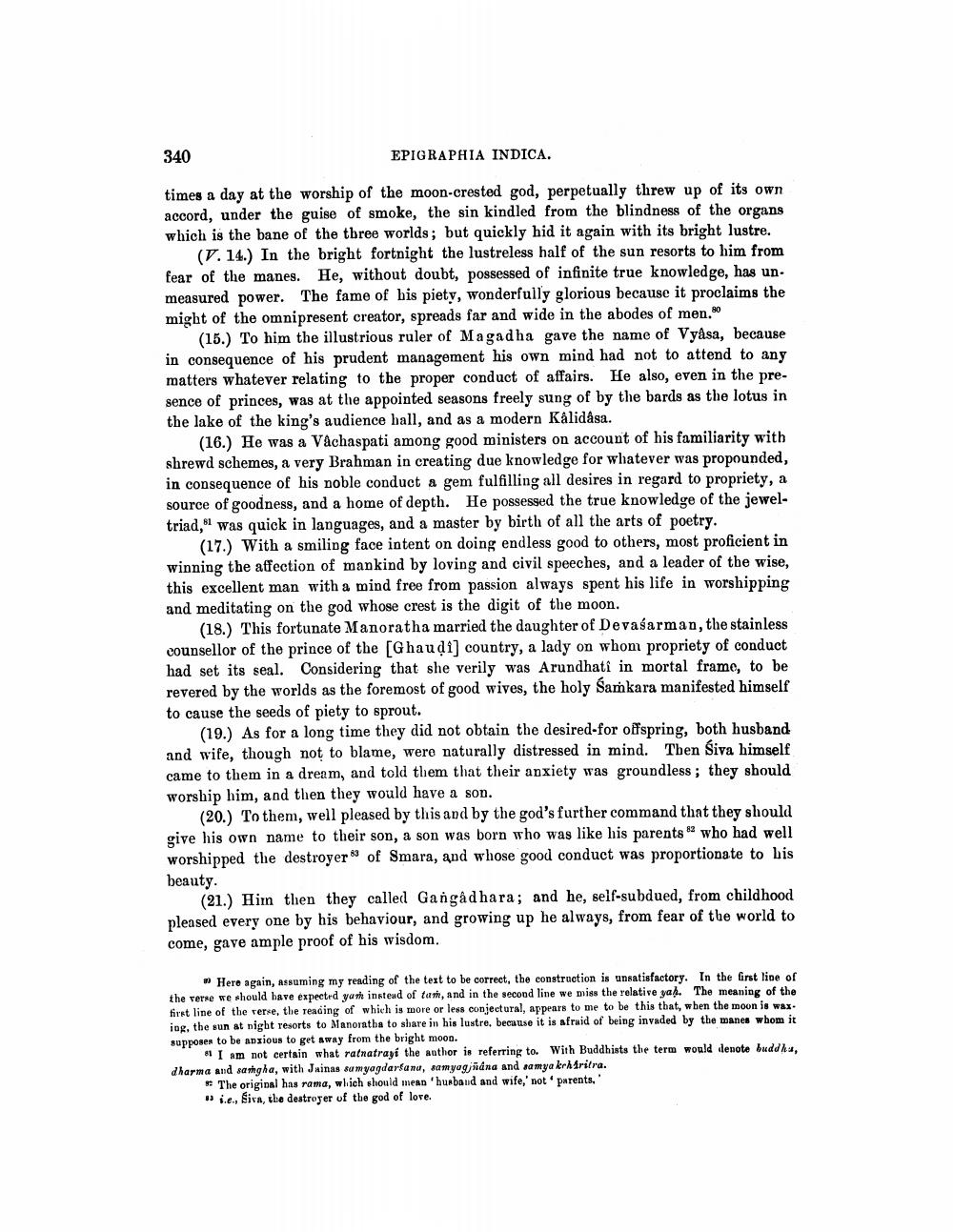________________
340
EPIGRAPHIA INDICA.
times a day at the worship of the moon-crested god, perpetually threw up of its own accord, under the guise of smoke, the sin kindled from the blindness of the organs which is the bane of the tbree worlds; but quickly hid it again with its bright lustre.
(V. 14.) In the bright fortnight the lustreless half of the sun resorts to him from fear of the manes. He, without doubt, possessed of infinite true knowledge, has un. measured power. The fame of his piety, wonderfully glorious because it proclaims the might of the omnipresent creator, spreads far and wide in the abodes of men.
(15.) To him the illustrious ruler of Magadha gave the name of Vyása, because in consequence of his prudent management his own mind had not to attend to any matters whatever relating to the proper conduct of affairs. He also, even in the presence of princes, was at the appointed seasons freely sung of by the bards as the lotus in the lake of the king's audience ball, and as a modern Kalidasa.
(16.) He was a Vachaspati among good ministers on account of his familiarity with shrewd schemes, a very Brahman in creating due knowledge for whatever was propounded, in consequence of his noble conduct a gem fulfilling all desires in regard to propriety, a source of goodness, and a home of depth. He possessed the true knowledge of the jeweltriad, I was quick in languages, and a master by birth of all the arts of poetry.
(17.) With a smiling face intent on doing endless good to others, most proficient in winning the affection of mankind by loving and civil speeches, and a leader of the wise, this excellent man with a mind free from passion always spent his life in worshipping and meditating on the god whose crest is the digit of the moon.
(18.) This fortunate Manoratha married the daughter of Devasarman, the stainless counsellor of the prince of the [Ghaudi) country, a lady on whom propriety of conduct had set its seal. Considering that she verily was Arundhati in mortal frame, to be revered by the worlds as the foremost of good wives, the holy Samkara manifested himself to cause the seeds of piety to sprout.
(19.) As for a long time they did not obtain the desired-for offspring, both husband and wife, though not to blame, were naturally distressed in mind. Then Siva himself came to them in a dream, and told them that their anxiety was groundless; they should worship him, and then they would have a son.
(20.) To them, well pleased by this and by the god's further command that they should give his own name to their son, a son was born who was like his parents who had well worshipped the destroyer of Smara, and whose good conduct was proportionate to his beauty.
(21.) Him then they called Gangadhara; and he, self-subdued, from childhood pleased every one by his behaviour, and growing up he always, from fear of the world to come, gave ample proof of his wisdom.
# Here again, assuming my reading of the text to be correct, the construction is unsatisfactory. In the Grst line of the verre we should have expected yash instead of tan, and in the second line we miss the relative gal. The meaning of the first line of the verse, the reading of which is more or less conjectural, appears to me to be this that, when the moon is war. ing, the sun at night resorts to Manoratha to share in his lustre, because it is afraid of being invaded by the manes whom it supposen to be anxious to get away from the bright moon.
#1 I am not certain what ratnatragi the author is referring to. With Buddhists the term would denote buddhu, dharma and samhgha, with Jainas samyagdarsana, samyogjñana and samyakrharitra.
The original has rama, which should mean 'husband and wife,' not parents, • i.e., Siva, the destroyer of the god of lore.




